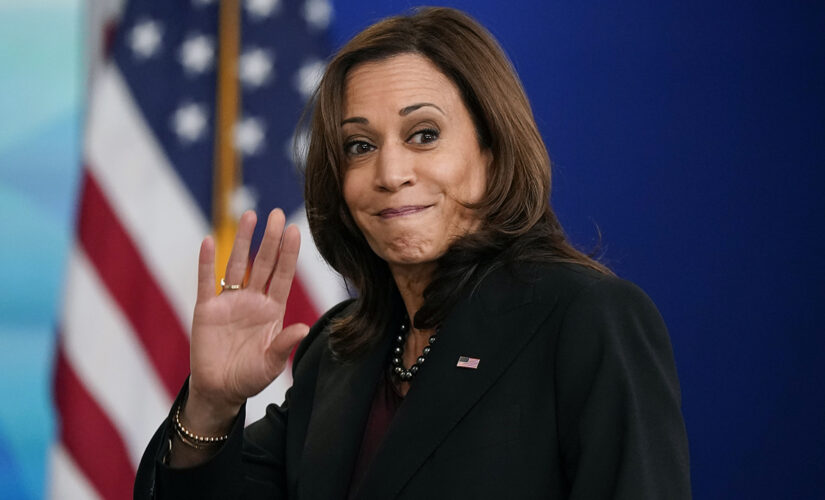NEWYou can now listen to Fox News articles!
Speculation is running rampant on who President Biden will nominate to be the next Supreme Court justice following the retirement of liberal justice Stephen Breyer at the end of the court’s term in June.
Some are speculating that Biden could nominate Kamala Harris to become the first Black female Supreme Court justice, after making history as the first female vice president.
Vice President Kamala Harris presides over the Senate Tuesday June 22 as Republicans blocked Democrats’ signature voting reform legislation. (CSPAN)
While the idea may be far-fetched — and one the White House tried to squash Wednesday — there is a possibility, at least legally, that Biden could both fulfill his campaign promise of nominating a Black woman to the Supreme Court while also giving Harris a dignified exit from the 2024 Democratic ticket.
Senate procedure experts say it is possible for Biden to nominate Harris to the Supreme Court — and for Harris to vote in her favor. The Senate is evenly split at 50-50, and Harris could conceivably cast the tie-breaking vote on her confirmation to the highest court of the United States.
PSAKI SAYS BIDEN ‘STANDS BY’ PROMISE TO NOMINATE BLACK WOMAN TO SUPREME COURT
“The Constitution doesn’t place any conditions on the types of ties the vice president can break as presiding officer,” Sarah Binder, a professor of political science at George Washington University and a senior fellow at the Brookings Institution, told Fox News Digital. “That would presumably leave the VP free to break a tie on confirming herself to the Supreme Court.”
Associate Justice Stephen Breyer poses during a group photo of the Justices at the Supreme Court in Washington, U.S., April 23, 2021. (Erin Schaff/Pool via REUTERS/File Photo)
James Wallner, a senior fellow at the R Street Institute and a guru at legislative procedure, agrees that there’s nothing in the Constitution that could stop Harris from voting in her favor if all 50 Republicans rejected her hypothetical nomination.
“Under the Constitution, yes, the vice president casts the tie-breaking vote,” Wallner told Fox News Digital. “Now whether or not that’s in good taste is something else and it could very well lead to further politicization of the Supreme Court. But as a matter of procedure, it seems to be pretty straightforward. If there’s a tied vote, the Vice President is authorized by the Constitution to cast that tiebreaker.”
President Joe Biden and Vice President Kamala Harris speak to the American people about constitutional voting rights in Atlanta, GA, on Jan. 11, 2022 United States. (Peter Zay/Anadolu Agency via Getty Images)
Biden stands by his campaign promise to nominate a Black woman to the Supreme Court, the White House reaffirmed Wednesday.
SUPREME COURT JUSTICE STEPHEN BREYER TO RETIRE
In addition to being a former senator and member of the Senate Judiciary Committee, Harris has a deep legal background as the former district attorney of San Francisco and former California attorney general.
The Senate would have to confirm the nominee fairly quickly before the November midterm elections, which could put the Senate back in control of Republicans. The confirmation can be done swiftly as then-Majority Leader Mitch McConnell, R-Ky., demonstrated with confirming Justice Amy Coney Barrett in a matter of a month.
So far, appeals court judges Ketanji Brown Jackson and Candace Jackson-Akiwumi have risen to the top of the list, in part, because they have already gone through the lengthy judicial vetting process and been confirmed by the Senate.
For his part, Biden said he plans to run again in 2024 with Harris. Press secretary Jen Psaki reiterated that Wednesday and said Biden “has every intention” of running for re-election with “Harris on the ticket as his partner.”
CLICK HERE TO GET THE FOX NEWS APP
There’s some uneven past practice in which senators refrain from voting to confirm themselves to a position, Binder said. For example, Hillary Clinton refrained from voting on her 94-2 confirmation in 2009 to become secretary of state, and Jeff Sessions also voted present during his 2017 confirmation for attorney general when the margin was a tighter 51-47.
Kamala Harris embraces U.S. President Joe Biden before his remarks at a menorah lighting ceremony in celebration of Hanukkah in the East Room of the White House on Dec. 1, 2021 in Washington, D.C. (Anna Moneymaker/Getty Images)
But vice presidents have cast tie-breaking votes on high-level positions before. Mike Pence, for instance, became the first-ever vice president to break a Senate tie over a cabinet nomination in 2017 to confirm Betsy DeVos as former President Trump’s education secretary.
In the unlikely scenario that Harris is Biden’s choice, the Senate and the House would also have to confirm a new vice president. The 25th Amendment says that whenever there is a vacancy in the office of the vice president, the president shall nominate a vice president who will need to be confirmed by a majority vote of both chambers.
Without a vice president in office, the next person in the line of succession to the presidency is Speaker of the House Nancy Pelosi, D-Calif.




